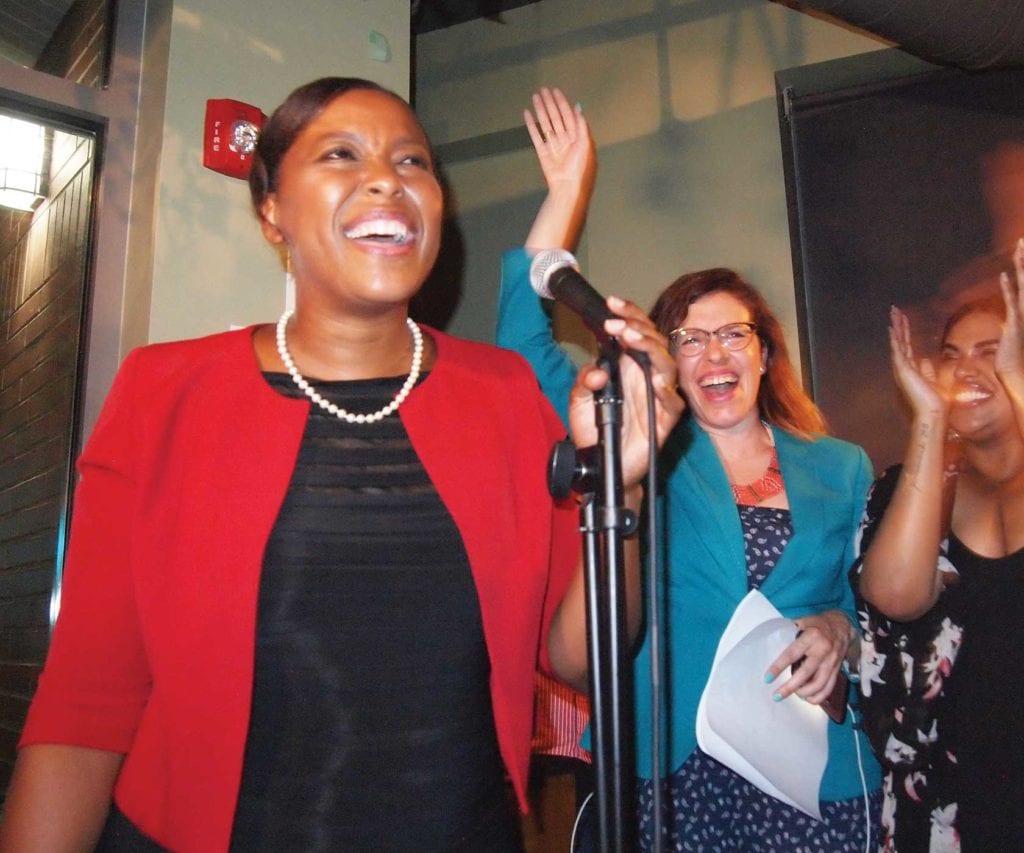
As state Rep. Nika Elugardo steps into her new role at the State House, she says she has already begun to turn her policy platform into a legislative agenda.
As a candidate running to unseat incumbent Jeffrey Sanchez for the 15th Suffolk District of Massachusetts, Elugardo ran on a platform that focused on a “justice for all” framework — health care, education, and housing for all — as well as what she calls the “two emergencies,” immigration and climate change. She calls these emergencies, she said, because “our federal government is attacking those things pretty aggressively.” Now she is focusing on turning her platform into a legislative agenda.
“In this next week I’ll be releasing the very first drafts [of this agenda], which I’ll be working on over the years,” Elugardo said.
Elugardo will also focus her efforts on the Healthy Youth Act and Bill H.1426, both of which failed to pass in the House last session. The Healthy Youth Act, H.3704, would institute more robust, medically accurate sexual education in Massachusetts schools, and Bill H.1426 would allow public defenders to unionize. These bills, she says, “should have passed and can pass.”
Elugardo says Speaker Robert DeLeo has indicated that the Legislature will be picking up the foundation budget that governs Chapter 70 education aid, some immigration measures and possibly the Safe Communities Act, which would bar police from participating in immigration enforcement.
These bills are “low hanging fruit” for her as a first-year legislator, Elugardo said, because they passed with broad approval in the Senate and had strong support in the House, yet failed to move forward under House leadership.
Elugardo is among the 18 of the 32 new House members who are self-described progressives. She says she expects to work with House leadership to advance her progressive agenda, even though as a candidate, she characterized the House leadership’s tight control over legislation as a “plantation model” when she spoke to the Banner last summer.
“I haven’t taken a confrontational stance against individual people other than Jeffrey Sanchez,” she said. “I’ve taken a confrontational stance against a culture and a practice of centralized leadership, and against a longstanding but increasing practice of having major distinctions between what Legislature can do and what actually happens … The Safe Communities Act, the Foundation Review Committee bill, the climate bill being prime examples of that.”
Elugardo would like to see a shift to “a culture of courage and innovation” in the House.
However, she is realistic about her position as a newly elected representative.
“I am mindful that I have to learn how it actually works from an internal perspective before I can know for sure what it would look like to change it,” she said.
Though Elugardo speaks with passion and love for her Boston community, the new representative is not a Massachusetts native. She grew up in Ohio, with a father who she says trafficked marijuana for a living. Elugardo was noticed by her vice principal as an exceptional student. He advised her family to take her out of her local school system, because she was being understimulated and acting out and the high school she was charted to go to had a high rate of violence against girls.
The vice principal worked with Elugardo’s grandparents to get her a scholarship to one of the best private schools in Ohio.
While this was a positive change for her, Elugardo was angry that her vice principal and family had not instead worked to fix the local school system. She remembers this as the moment when her passion for education justice began. She thought, “Every kid in my neighborhood deserves the education I’m getting at the private school,” she recalled.
That private school opportunity likely helped Elugardo on her journey to MIT, where she majored in Urban Studies and Planning, and in her early career in community and economic development.
Elugardo counts a lot of supporters along her path. Her dad taught her how to fight at age 7 because he knew she would get attacked by boys in her neighborhood. She says she was able to fight back, and when she wasn’t, someone was there to help her. From a neighborhood girl stepping in to defend her, to her vice principal and grandparents supporting her education, to the community she built at MIT that helped her graduate, she recognizes many champions in her own life. Government, she said, should champion people as well.
While she says she was skeptical of government as a child, she came to the realization that it’s the constituents who make up government.
“We have to elevate our thinking as voters,” she said. “That’s what it means to participate in a democracy — to hire somebody and then to hold them accountable.”






